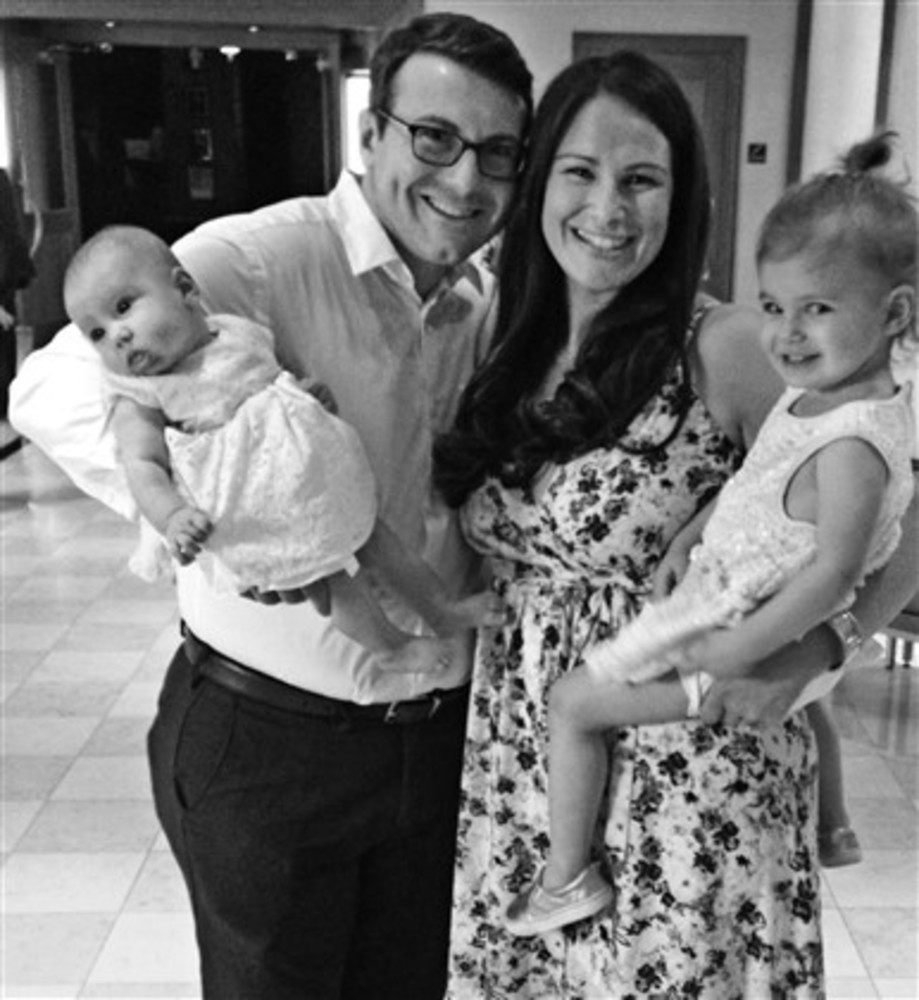David Perolman leads by example
 David Perolman and family. /Photo | David Perolman
David Perolman and family. /Photo | David Perolman
Habonim’s new education director and song leader
If you tried to find someone who plays more instruments than David Perolman, you’d probably fail. It’s not a dare – only a simple warning – don’t even bother. Perolman, the new education director and song leader at Temple Habonim in Barrington, boasts a wide range of musical knowledge. Growing up, he was always learning to play a new instrument, including trumpet, horn and tuba. He played some of them in a marching band while in high school. Guitar was the next step, followed by piano, ukulele and mandolin. Oh, and don’t forget about percussion. He is a walking orchestra!
At Towson University in Maryland, Perolman studied communications, advertising, electronic media and film. Learning multiple instruments and disciplines of study didn’t faze this young man, who was used to challenging changes. Because his dad was in the army, the family moved every two years. Yet, wherever they ended up, they’d always find a Jewish community to join, even in Southwest Arizona, where they were one of 20 Jewish families.
Perolman says that he was raised in an accepting atmosphere, with his parents believing in allowing him to choose his own path. All family members ultimately decided to pursue Judaism. His Catholic mother converted, and his sister became a rabbi. Both of his parents are members of a choir, and his dad is on the board of their synagogue in Maryland. Perolman says, “They led me by example.” Now he is doing the same not only for the congregation’s students, but also for his two daughters, Ariel and Sydney. Married to his high school sweetheart, Danielle, who is “over the moon” about his new role, Perolman is excited to be living close to the temple.
He explains that his connection to Judaism stems from the morals and values found in the Torah, which he teaches to the congregation’s children. Perolman laments that many aspects of the modern world impede children’s connection to the texts. He sees that disconnect as his challenge, vowing to make religion more germane for the kids through hands-on learning. One of Perolman’s passions is social justice – he closely follows current events, using them to illustrate concepts, as well as exploring their depth in discussion and sometimes practice. He explains that awareness is usually followed by reflection, which often leads to action – striving for legislative changes. Perolman believes that his goal should be to instill the desire to do the right thing, to be the bigger person in all aspects of life.
It’s not surprising then that he is looking forward to moving the religious school’s curriculum to a project-based one. Currently, the kids at the religious school follow the Union for Reform Judaism CHAI curriculum, based on the essential concepts of the Jewish life. Perolman aims to inspire the children to delve deep into texts by presenting readings in a way that would be relevant to the students. Sometimes, it means resorting to popular culture. For instance, Perolman teaches Livnot (building) to eighth and ninth graders. In a lesson about self-worth, he explains why the logic of the 10 spies who returned from Israel was flawed. They left because they were self-conscious about their small stature. Perolman brings up the movie “Pitch Perfect” to offer an example of confidence – the desired behavior. A plump character introduces herself as Fat Amy so that others can’t belittle her for her large size – she has already done that herself, proving that she’s OK with it. Perolman sums up, “Don’t live your life based on how others might see you.”
He is also a big fan of lessons with an action component. To study media bias, he might take the children to a television station. There, they can observe how the program director will spin a news story. To witness food insecurity, Perolman would plan a trip to a soup kitchen or food pantry, such as TAPIN in Barrington. Taking these trips, the students will learn to do positive things, help others. Perolman acknowledges that it’s easy to stay in your bubble, but says that we should look beyond ourselves. He believes that, as Jews, we have a duty to explore and question. Perolman hopes that his students will connect to the social justice component of Judaism. He, in turn, will provide a modern take on our rich tradition.
IRINA MISSIURO is a writer and editorial consultant for The Jewish Voice.







